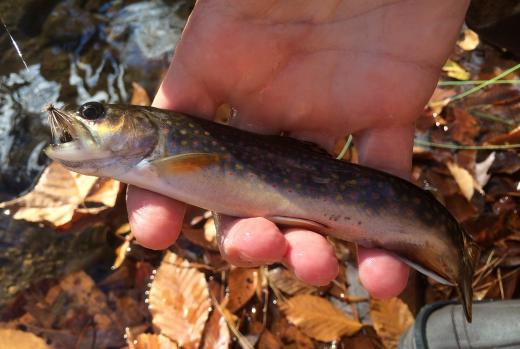
Nov. 18, 2014
Contact:
Elizabeth Maclin, Eastern Conservation Vice President, 703-284-9437, emaclin@tu.org
Mark Taylor, Eastern Communications Director, 540-353-3556, mtaylor@tu.org
FOR IMMEDIATE RELEASE
Trout Unlimited: George Washington National Forest Plan protects important trout habitat by taking a sensible approach to energy development
New plan will not allow leasing of additional lands for energy extraction, reducing risks to coldwater streams
WASHINGTON, D.C.The new George Washington National Forest management plan offers a reasonable approach to shale gas development on the 1.1 million acre forest in Virginia and West Virginia, according to Trout Unlimited, the nations leading trout and salmon conservation group.
The new plan, which was released today, will not allow the leasing of additional land for energy extraction, minimizing potential risks to the hundreds of miles of forest streams holding wild and native trout.
The plan allows for energy development on 10,000 acres on which oil and gas companies already hold leases. An additional 167,000 acres where companies hold underground mineral rights will also remain open. That equates to 16 percent of the forest.
Trout Unlimited applauds the Forest Service for promoting responsible energy development while protecting critical trout habitat, said Elizabeth Maclin, the organizations vice president of eastern conservation. We agree that oil and gas development should be done the right way, but not in the wrong place.
Among the places the plan makes off limits for leasing is the Laurel Fork, a brook trout stronghold and one of the most pristine watersheds in the forest.
TU was an active participant in the forest planning process, and encouraged its members to provide input.
The organization is currently highlighting the George Washington and Jefferson national forests in its 10 Special Places campaign (tu.org/special-places), which focuses on public lands in the Central Appalachian region where shale gas drilling and related infrastructure could pose risks to fishing and hunting resources. Combined, the forests contain 60 percent of Virginias wild brook trout streams, and those critical resources must be afforded the utmost protection from energy extraction activities and related infrastructure.
Maclin praised several other aspects of the plan that could benefit the forests coldwater resources, and sportsmen and women who fish and hunt on the forest.
For example, the plan provides for increased protection of rivers and streams by expanding the width of riparian corridors. It also proposes several actions to provide for watershed health in the face of a changing climate, including improving stream connectivity by replacing standard culverts, improving stream crossings and bridges to better withstand major runoff events, decommissioning roads in areas where they are not needed or causing unacceptable resource damage, and controlling sources of erosion and stream sedimentation.
XXX
Trout Unlimited is the nations largest coldwater conservation organization, with 155,000 members, including more than 8,000 in Virginia, dedicated to conserving, protecting, and restoring North Americas trout and salmon fisheries and their watersheds. Follow TU on Facebook and Twitter, and visit us online at tu.org.


